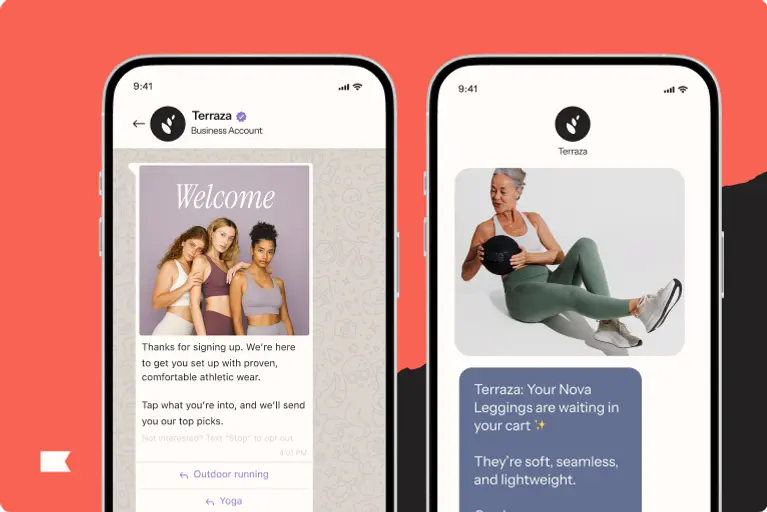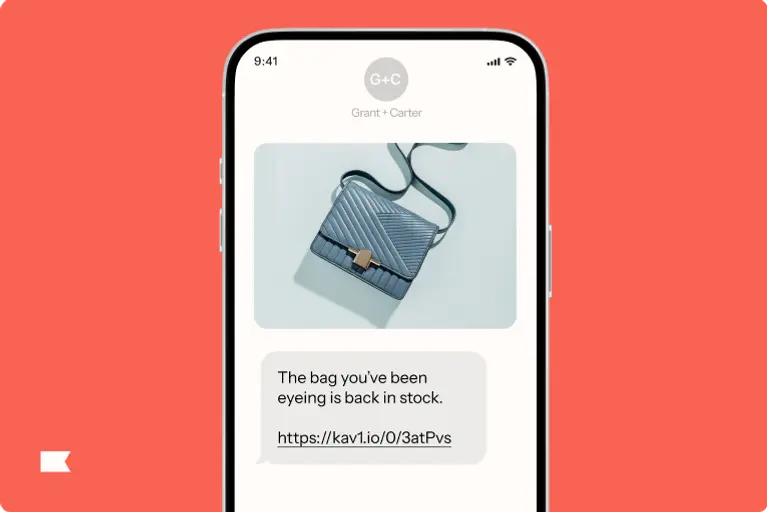In the US, Canada, and New Zealand, short codes are a great way to send mass SMS marketing campaigns that come from a short, memorable phone number.
They deliver SMS messages fast, too. Where it might take other number types up to 50 minutes to deliver a campaign, a short code can typically do it in 5 minutes.
Here, you’ll learn what SMS short codes are, how to perform an SMS short code lookup, and how to register codes for compliant, high-deliverability SMS marketing.
What are SMS short codes and how do they work?
An SMS short code is a 5- or 6-digit phone number that businesses use instead of a 10-digit number for SMS marketing campaigns.
Short codes are great for high-volume, mass SMS messaging in the US, Canada, and New Zealand for two key reasons:
- They have a fast per-second send rate.
- Due to strict approval processes and opt-in, they’re filtered less by carriers and have high deliverability rates.
Short code numbers are easily recognizable because they’re shorter than regular cell phone numbers. Brands can also lease a vanity code, which is a custom short code that better represents the brand or campaign.
The US Short Code Directory and Common Short Code Administration (CSCA) can randomly assign you a short code for a lower cost. If you use Klaviyo for SMS marketing, we can also help.
Dedicated vs. shared short codes
Dedicated short codes are used exclusively by one brand. They give businesses full control over their messaging, keywords, and customer experience. Because no other sender shares the number, dedicated short codes are ideal for large-scale SMS marketing programs.
Shared short codes—where multiple brands used the same number—were phased out by major US carriers starting in 2021 due to compliance risks.
Vanity vs. random short codes
Vanity short codes, also called select short codes, spell out memorable key words with specific digits (for example, “73223” to spell “PEACE”). Vanity codes cost more but are easier to remember and more recognizable to your subscribers.
Important note: With Klaviyo, vanity short codes are available in the US, and they’re your only option if you want to use a short code in Canada and New Zealand. (Vanity short codes are also available in the UK, but they are much less popular there.) Random short codes are only available in the US.
What are my options if I don’t want an SMS short code?
If you want to start sending text messages to subscribers but you don’t want a short code, your options include:
1. Branded sender IDs
With branded sender IDs, also called alphanumeric sender IDs, your brand’s name is displayed as the sender ID or number when you send one-way SMS messages. Brands aren’t able to use this message type for two-way SMS, keywords, or double opt-in.
While the same branded sender ID may be used across countries, the US and Canada don’t support them. If you want to send SMS messages in those markets, opt for toll-free numbers or short codes.
2. Toll-free number
Toll-free numbers are a cost-effective option for brands in the US and Canada that are exploring SMS. Common use cases for this option include:
- Customer service and support messages for inquiries, feedback, and assistance
- Transactional messages such as purchase confirmations, shipping notices, and delivery notifications
- Marketing campaigns like promo codes, new product announcements, and limited-time offers
- Surveys, polls, and feedback requests to gather valuable customer data
Unlike 10DLC (more on these next), toll-free numbers use an 8XX prefix, such as 800, 833, 844, 855, 866, 877, and 888. They may be a good choice if you need reliable application-to-person (A2P) messaging but aren’t ready for the higher cost and commitment of a short code.
3. 10DLC number (US only) or long code (all other regions)
In the US only, a 10-digit long code, or 10DLC number, is more affordable than a short code. It can be activated with a local area code so that communications appear more authentic based on a company’s location.
But a 10DLC number is slower to send and has a higher risk of carrier filtering compared to short codes. And as of February 2025, all 10DLC numbers require registration through The Campaign Registry, where both the brand and each messaging campaign must be vetted and approved by carriers before messages can be sent.
These requirements help reduce carrier filtering, but filtering is still possible for businesses that don’t closely adhere to guidelines. And 10DLC messages are still subject to throughput limits based on the sender’s trust score. To compensate for slower send rates, some brands purchase multiple 10DLC numbers.
Outside of the US, long codes mimic the format of local mobile numbers where they are activated. Area code recognition is not available with international long codes, but activation is much simpler, and throughput is not constrained by a brand’s reputation but rather determined by aggregators.
Important note: Klaviyo does not support 10DLC in the US, or long codes in the US, Canada, France, or New Zealand. In the UK, Australia, Ireland, and several other regions throughout Europe, we support country-specific domestic Long Codes.
Business SMS phone number options
Characteristic | SMS short code | 10DLC | Long code | Toll-free number | Branded sender ID |
|---|---|---|---|---|---|
Length | 5–6 digits | 10 digits | 10 digits | 10 digits | 4–11 characters |
Number of SMS subscribers | Recommended for 15K–30K; strongly recommended for 30K–50K | <15K | Any | <15K | Any |
Approval time | Several weeks | Varies by use case | Varies by use case | 2–5 business days | Instant in regions where they’re the default |
Message filtering | Minimal | Moderate | Minimal | Moderate | Minimal |
Ideal for | High-volume, branded sends | Two-way communication, customer support, transactional messages, customer feedback on marketing | Two-way communication, customer support, transactional messages, customer feedback on marketing | Two-way communication, customer support, transactional messages, customer feedback on marketing | One-way communication where brand recognition is important, like event invites |
Regional availability with Klaviyo | US, Canada, UK, New Zealand | Not available | UK, Ireland, Belgium, Netherlands, Germany, Austria, Spain, Switzerland, Denmark, Sweden, Norway, Finland, Italy, Portugal, Poland, Hungary, Australia | US, Canada | UK, Ireland, France, Netherlands, Germany, Austria, Spain, Switzerland, Denmark, Sweden, Norway, Finland, Italy, Portugal, Poland, Australia |
How to look up SMS short codes for free
Before you launch your SMS marketing program, you’ll want to verify that a short code is available.
Here’s some information on how to look up SMS short codes for free in the US, Canada, and the UK. Note that you’ll need to check availability for every country where you want to use short codes.
United States free SMS short code lookup
The US Short Code Registry is a trustworthy directory maintained by the Cellular Telecommunications Industry Association (CTIA). It’s the official resource for checking whether a short code is available to lease.
Here’s how to use it to conduct short code lookups for free:
- Visit usshortcodes.com.
- Click “Find a Short Code.”
- Search for your desired 5–6 digit number.
- View the status of the short code. If it’s available, you can add the number to an online cart. If it’s unavailable, you’ll be presented with similar short codes to choose from instead.
Canada free SMS short code lookup
For Canadian short codes, the Canadian Telecommunications Association maintains a registry of current short code programs. You can search for available short codes in the registry. You’ll also be able to see active short codes, company name, short code number, and URL.
United Kingdom free SMS short code lookup
The official reservation and allocation system for UK short codes is managed by the Shortcode Management Group (SCMG). This is where you can browse available short codes and view registered service providers.
Short code pricing and fees
SMS short code pricing varies depending on whether you choose a dedicated or vanity short code, as well as your messaging volume and the SMS marketing provider you select.
Cost type | Price range | Payment frequency |
|---|---|---|
Dedicated (random) short code | ~$500 | Monthly |
Vanity short code | ~$1,000–$1,150 | Monthly |
When considering costs, remember that for brands sending high-volume SMS campaigns, SMS short codes can deliver better results thanks to their carrier pre-approval per the Short Code Registry. Here’s what that investment gets you:
- High throughput: Quickly send hundreds of messages so your time-sensitive campaigns reach customers when they matter.
- Lower filtering: Carrier pre-approval and strict vetting mean your messages land in inboxes instead of getting blocked as spam.
- Better brand recognition: Customers are more likely to trust messages from consistent, recognizable numbers, especially for order updates and promotional campaigns.
Why short code compliance matters
When it comes to SMS marketing, compliance isn’t just a box brands are required to check. It’s a foundation for trust and SMS deliverability.
When you properly register a short code, the CTIA will conduct audits to ensure compliance. As soon as you begin running a SMS marketing program, take care to:
- Get explicit permission to send promotional material to subscribers, with clear calls to action that communicate what people are signing up for.
- Use double opt-in to confirm a subscriber’s consent to send messages to them.
- Include your brand’s name at the beginning of every message to make it clear to subscribers who they’re hearing from.
- Provide a clear opt-out mechanism and honor requests immediately.
- Comply with time of day restrictions. Avoid sending messages anytime before 8:00 a.m. and after 9:00 p.m. in the recipient’s time zone.
If you fail these compliance checks, you risk being filtered, blocked, or fined—and your deliverability can tank.
4 SMS short code best practices
Short codes help provide an excellent customer experience. Here are 4 SMS short code best practices for achieving that:
1. Understand local SMS compliance laws
It’s important for your SMS campaigns to be compliant with the local laws where you do business. Make sure your business complies with the Telephone Consumer Protection Act (TCPA), Cellular Telecommunications Industry Association (CTIA), and other messaging authorities.
Whether you send from a short code or a long number, always respect your customers’ privacy and honor their opt-in and opt-out requests. Never spam or send unwanted messages.
2. Use vanity short codes for memorable brand messages on other channels
Vanity short codes can be a great way to create a memorable number that your customers can text to opt in to campaigns, contests, discounts, and much more.
This versatility is often worth the extra cost. Because vanity codes are typically easier to remember than a string of numbers, you can use them in omnichannel campaigns across print, billboards, digital messaging, radio ads, podcasts, and more. This can help you create unique customer experiences through text messaging.
3. Use RCS to improve brand recognition
If you’re using Rich Communication Services (RCS) in your text message marketing, you can take brand recognition further with a verified business profile that automatically displays your logo and a verification badge. This can make your brand instantly recognizable and protect customers from phishing attempts.
4. Use keywords in your short code texts
Tracking return on investment is key to the success of any marketing campaign. To attribute revenue back to your SMS marketing campaigns and flows, use custom keywords to track where your subscribers are coming from.
For example, you might say:
- “Text IG to 34267 to get an exclusive offer” on Instagram.
- “Text ENTER to 34267 to enter our giveaway” if you’re trying to grow your list with a contest or giveaway.
How to get a short code with Klaviyo
When you’re ready to apply for a short code as a Klaviyo customer, follow these steps:
- Navigate to Settings > SMS > Add country, then select the option to apply for a short code.
- Fill out the short code request form. If you want multiple short codes, fill out the form multiple times.
- A Klaviyo expert will review your application within a few business days.
- If anything is missing or needs to be updated, you’ll receive an email from a Klaviyo specialist.
- Once the application is complete, Klaviyo creates mockups of your sign-up forms in your account.
- Klaviyo submits the application for approval to carriers and emails you to let you know when they either approve or deny it.
Klaviyo SMS helps you reach, convert, and retain customers with personalized, timely conversations—all powered by AI and unified customer data. With Klaviyo, you can:
- Personalize messages with a built-in data platform and two-way conversations.
- Reach shoppers around the world with SMS, RCS, WhatsApp, email, and mobile marketing all in one platform.
- Use automated testing and list growth tools to drive more text message revenue, faster.
- Make decisions based on ROI with multi-channel attribution and reporting.
Connect with customers via personalized text messaging with Klaviyo




